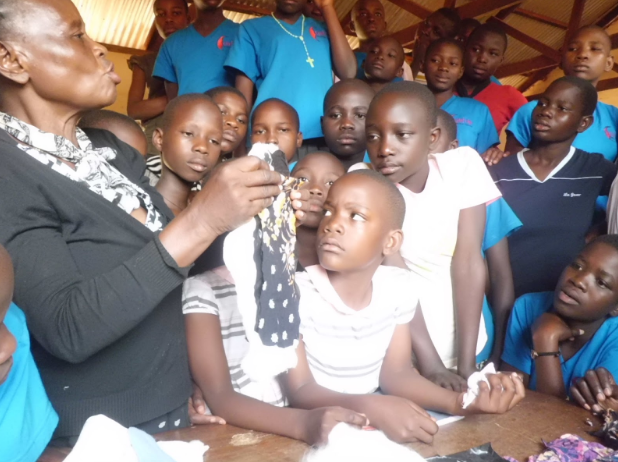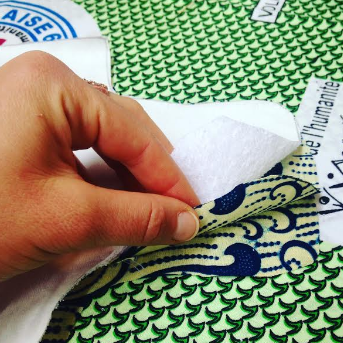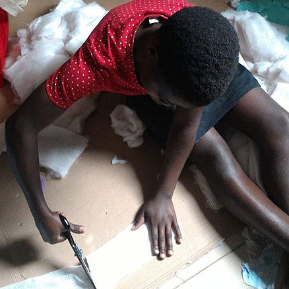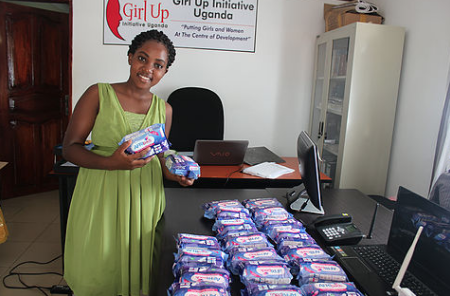(Above: GUIU participant making her first reusable sanitary pad during a puberty and menstruation training session.)
Menstruation is one of the most normal biological processes as well as a key sign of reproductive health. Yet, in many cultures today, it is still greatly stigmatized and treated as something shameful or dirty. Recently, May 28th marked Menstrual Hygiene Day, an opportunity to call attention to the needs and challenges women and girls face. The continued silence around menstruation, combined with limited access to information at home and in schools results in millions of girls having very little knowledge about what is happening to their bodies when they menstruate, and how to deal with it. This is often accompanied by a lack of sanitary products, services, and facilities to adequately manage the monthly occurrence. Girl Up Initiative Uganda (GUIU) is committed to bridging the knowledge and skills gap in managing menstruation. At a macro level, more stakeholders should invest in addressing the issue, particularly as it pertains to achieving the global sustainable development goals (SDGs). Following behind the Women Deliver Conference which explored how to strengthen the role of women and girls’ health and rights as the world moves closer to fulfilling the 2030 Agenda, this is a timely moment to examine the relevance of menstrual hygiene.

It’s a movement! #MenstruationMatters
The theme for this year’s Menstrual Hygiene Day was ‘menstruation matters to everyone, everywhere’, highlighting the inclusive approach necessary for addressing menstruation challenges and scaling up global solutions. Specifically, the five pillars that constitute this view are: that menstruation matter worldwide; that it matters to boys and men; that is matters in all areas of life; that is matters to equality; and that it is an issue of inclusion as a whole. As noted in our recent post on notable quotes from the Women Deliver Conference, just as the SDGs apply to developed and underdeveloped countries equally, so should menstrual health be attainable globally. The topic of menstruation came up throughout the conference in different sessions, and large international nonprofits are beginning to pay attention to how it relates to the fulfilment of the SDGs. For example, the International Committee of the Red Cross had an exhibition where they facilitated a demonstration on how to make reusable sanitary pads.

So, how does this relate to the Sustainable Development Goals (SDGs)?

SDG 4: Quality Education - Ensure inclusive and equitable quality education and promote lifelong learning opportunities for all. The challenges surrounding menstrual hygiene have massive implications for girls’ access to education. Lack of products, correct information, and infrastructure from a WASH (Water, Sanitation and Hygiene) standpoint leads to low attendance and high dropout rates. According to UNESCO, one in 10 girls misses school during menstruation. Educational institutions alongside organizations like GUIU have the opportunity and the responsibility to ensure that girls are accommodated in schools, and to collaborate with other key stakeholders such as government agencies to provide the necessary support.

SDG 5: Gender Equality - Achieve gender equality and empower all women and girls. Perhaps one of the most important SDGs menstrual hygiene addresses given its cross-cutting nature, is the impact it has on gender equality. As it connects to SDG 4, girls who are more educated, confident, and focused on creating a better life for themselves, families and communities are more likely to move out of the poverty cycle and challenge gender stereotypes and norms. If women and girls are burdened by the inability to manage their menstrual hygiene, they cannot invest in the facets of their lives that will enable them to become empowered; nor will it allow them to stand up to the associated stigma, which feeds into the cycle of gender-based discrimination.

SDG 6: Clean Water and Sanitation - Ensure access to water and sanitation for all.
This outlines the need to “provide sanitation facilities and encourage hygiene at every level”. The WASH community has a vested interest in allocating resources to menstrual hygiene from ensuring access to clean water to providing waste disposal bins for sanitary products in the school bathrooms.
These three SDGs are invariably interlinked by the immense need for proper menstrual hygiene products, information and instructure. In today’s day and age, it is embarrassing that this is still an issue that we are discussing and finding ways to address, and makes one wonder what it would be like if men had to deal with menstruation each month. Would sanitary pads and tampons be free?
What does this mean for Girl Up Initiative Uganda?
When asked what girls want to learn from the GUIU after-school Adolescent Girls Trainings, the number one response we hear is: “to learn about puberty and menstruation!” There is no question that girls want to gain the correct information on what happens to their bodies during puberty. Given their limited capacity to manage their periods due to a number of factors, we developed a strategy to equip our women and girls with the skills to make sanitary pads from locally available materials.

GUIU would like to do more not only in terms of supplying the girls with menstrual hygiene products, but also in sensitizing their male counterparts to be supportive - rather than succumb to menstruation taboo and afflict the girls’ self-esteem during such a turbulent phase of their lives. We are also keen to find out what can be done about other related challenges girls menstruating may face that require more research and data, in particular, how the lack of access to basic painkillers for menstrual pains may also influence school attendance rates. In general, the discrepancies in data collection around menstruation need to be rectified by both accurate and understandable questionnaires, so we are aware of what impact research and project implementation has on girls’ livelihoods.

We are continuing to see the menstruation movement manifest in various ways around the world to shed light on the issue and encourage action at every level; including attempts to make pads and tampons tax exempt to statements by individuals artfully protesting against the censorship by the media and other institutions which appear to shame women and girls’ menstruation.
For those of us who have access to sanitary products, clean water, painkillers, disposal bins, phone apps to track our cycles, and other things that simplify menstruation hygiene management, it is a good time to be grateful for our privilege and consider what needs to be done for those without this access.